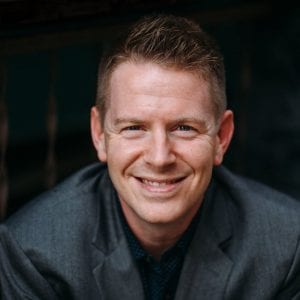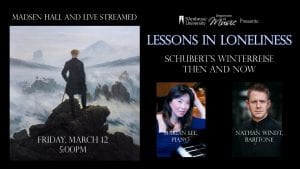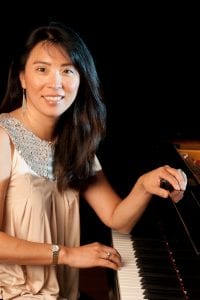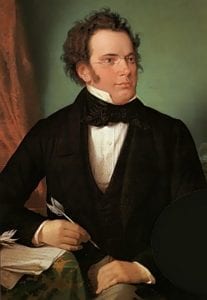St. Ambrose Music Professors Partner in Profound Song Cycle on Loneliness
Fortunately, there are technically just 10 days left in winter – but our yearlong battle with loneliness and isolation may continue in spring. Baritone Nathan Windt and pianist Marian Lee on Friday will present selections from the preeminent song cycle on this season of discontent and its profound connection to life today.

Nathan Windt has been director of choral activities at St. Ambrose since 2014.
The St. Ambrose University assistant professors will perform from Franz Schubert’s 1827 “Winterreise” — considered by many to be the pinnacle of the German song-cycle repertoire. Written nearly 200 years ago, it may seem that the story of a wanderer making sense of his place in the world without love is just a love story gone wrong.
However, as we’ve endured one year of living in a pandemic, “the wanderer’s feelings of isolation and loneliness seem more relevant today than perhaps at any point in our lives,” according to the event Facebook page. They will perform at 5 p.m. Friday from Madsen Hall, streamed on Facebook Live, and they’ll discuss the connection between the wanderer’s pain and our own today, and how we try make sense of our place in this world.
“Everybody’s struggling with stuff,” Windt – a 41-year-old native of suburban Chicago and SAU director of choral activities since August 2014 – said recently.
He’s never sung “Winterreise” (which means “winter’s journey”) before in public, and as a lover of German art song, he called it “the Everest” of song repertoire. Windt will sing about a third of the 24-song cycle.
“We’ll get 10 music students in the room, talk about how all these instances of the wanderer’s reflection on loss, loneliness and isolation connect to the same feelings we’re experiencing today,” he said. “It’s one of those terrible ironies — music and poetry of 200 years ago is extremely relevant today.”

Baritone Nathan Windt and pianist Marian Lee will present selections from “Winterreise” on Friday at 5 p.m., on Facebook Live.
Windt noted the 11th song, “Spring Dream,” where the wanderer is dreaming about trees and flowers and sunshine. “I also personally appreciate it because I hate winter — like I just I don’t like the cold,” he said. “I don’t like the snow, and I grew up with it. It’s like this is what you get in the Midwest.
“The reason he’s dreaming of it, it reminds him of times he was with his love, and at the end of the 11th song, he asks the question — when will I hold her in my arms again?
“That question is the question we’re always asking ourselves — when will things get back to normal?” Windt asked. “I think there are a lot of parallels right there in the song cycle. So I picked seven or eight songs out of the 24, that can give the audience kind of a teaser of the whole cycle. We’re gonna do the whole cycle in November. So we think this is a good way to kind of introduce our students to it.”
“These are songs that I think have a significance for how we deal how we as humans deal with these issues of loss and isolation,” he said.
“Winterreise” is set to poems by Wilhelm Müller and tells the story of a lonely traveler who ventures out into the snow on a journey to rid himself of his lost love. Along the way, he experiences a turmoil of different emotions, mostly ranging from despair to greater despair, according to Theconversation.com.
During his short life (Schubert died in 1828 at 31, from syphilis), the composer wrote over 600 art songs, 20 sonatas for piano, six major works for violin and piano, nine symphonies for orchestra and an impressive amount of chamber music.
The L.A. Philharmonic wrote that the “Winterreise” cycle — 16 of whose songs are in minor keys – “depicts the emotions of a lovelorn wanderer against a bleak, wintry landscape. The cycle is, in the words of Schubert authority Richard Capell, ‘70 pages of lamentation on lamentation… whose interest lies in depth of feeling rather than psychological refinement.’
“The cycle is a succession of states of emotion… but avoiding sentimentality. Neither the miller [of Die schöne Müllerin] nor the wanderer is a sentimentalist. They do not compose their states of emotion, but directly face, all unprepared, the blasts of the different and surprising hours of life.
“Among the many marvels of Winterreise is that the composer, with not a little help from Müller, whose verses might have been created for Schubert’s music, is able to project such intense drama without employing to any marked degree that seemingly inherent and vital sustaining element of drama: conflict,” according to the L.A. Phil. “It isn’t there in Müller, and it’s not there in Schubert. The cycle is about one solitary, unhappy person not so much fighting as submitting to fate – with only the feeblest glimmerings of hope during the course of his wintry trudge.”
Having hope in midst of darkness
There is light and hope on the horizon after our dark winter, but there’s not much in “Winterreise,” Windt said.
“If you think of all of the sectors of society that have been really affected by the pandemic, it’s music and the arts, right? Think of all the

Marian Lee is head of the keyboard area at St. Ambrose University, Davenport.
canceled performances and all of these gig musicians who have lost a significant income,” he said. “I’m super fortunate because I’m teaching at the university, so I just understand how difficult it is for musicians, and it’s not for me.
“It’s tough, because I, as I’m singing this, I’m also struggling with these feelings of how difficult it is to try to be expressive and to feel positive,” Windt said. “First of all, the poetry gets increasingly dark as it goes and secondly, just myself struggling with these issues of like, when will things happen normally? We’ve been in a year here and it’s really easy to kind of follow this dark road that the wanderer takes too, and it’s just not gonna get better.”
Schubert – who had been living with syphilis for about five years when he wrote the cycle – may have had a premonition of his own death within a year, Windt said.
“Before he died, I think it would have been next to impossible for him not to think about his own mortality when he’s writing this and his own health struggles,” he said, noting he was successful during his lifetime.
“He was quite respected and did rather well in terms of publication of his music,” Windt said. “So he wasn’t this romantic myth, you think of like Mozart being buried in a pauper’s grave or all these composers who kind of slip into nothing. He was pretty fortunate in his time. But he never married and there’s obviously issues of isolation and loneliness.
“It’s hard to see how he couldn’t have portrayed himself in the story of the wanderer,” he said. In today’s society, “We have enough sadness. We have enough heaviness,” Windt said. “I don’t want to contribute more to that, but I don’t want to take the poetry and pretend that there is a happy ending. “The ending isn’t written in the story. In the last song, there’s an encounter the wanderer has with this man, the hurdy-gurdy man, people have argued about is death,” he said. “Or is it more optimistic, like here he is encountering another human being? And maybe this can mark his return back to society.”
Windt has asked SAU’s Counseling Center to be on hand Friday, to provide resource links after the event for those struggling with issues of isolation, loneliness, or other mental health needs.
“I hope that we can provide some resources for people who are struggling with the same question of like, what does this mean?” he said.
“And since I can’t provide a fully optimistic answer, all I can say is, I hope there’s room for hope, and all of us are struggling with this,” Windt

Franz Schubert wrote 600 songs in his short life, including the “Winterreise” cycle in 1827, a year before his death at 31 from syphilis.
said. “So we, you know, here some resources. If you’re dealing with these issues, I think probably where I’m gonna be the most optimistic is describing the need for the need to find humanity and partnership.
“We’re not made to be isolated. Human beings, we’re not made to be isolated,” he said. “We’re not meant to be alone. And even if we cannot do things that we’re used to, there are still ways that we can. We can find humanity in other people. And I think that’s what’s gonna help us through these feelings.”
“There’s a cautionary tale, I think, in the hurdy-gurdy man,” Windt added. “We think of these people that we walk by in the street — people that are homeless, people that are destitute, that clearly are suffering. And what is our response as human beings? Do we continue to walk by them, or do we offer assistance? What is assistance?
“It’s not necessarily giving a handout, but I mean, maybe just the assistance is treating them like a human being,” he said. “And maybe the way we can interact with each other in these moments of isolation is rather than cocoon ourselves and further separation, we find ways to reach out and connect with others.”
In the Friday performance, Windt and Lee will provide less than a half hour of sung music, and will spend the rest of the time in discussion of “Winterreise.” Students in person will be at least 17 feet away from him, wearing masks. And Windt, unlike a normal solo vocal performance, will stand about 15 feet from Lee.
Partnering with GAHC and choir singing
The free Friday event is being co-presented by Davenport’s German American Heritage Center, where Windt has performed German songs previously.

German American Heritage Center
In 2019, he gave a program with songs of Schubert, Brahms and Mozart, and he plans to return there this November, with the full “Winterreise” and accompanying photos by Randy Richmond.
“He already has some of the photos and the advantage of us waiting to November to do all of this is, he’s going to be able to get some nice spring pictures,” Windt said. “I think the idea is, it was just a natural fit to incorporate. I love collaborating with the German American Heritage Center. So it was just an obvious partnership in terms of giving them an opportunity to be a part of this community, where we could talk about the great contribution that these songs have to our culture. And, of course, since they’re in German, it was a natural set to ask them to partner with us. And they were enthusiastic about that, which I appreciate.”
At SAU, Windt leads a concert choir of 45 students and chamber choir of 21. While they have been rehearsing together, they haven’t been able to give public concerts due to Covid.
“They can still have that community experience,” he said of students. “People are feeding off the moment. They’re missing that kind of community — for me as an educator, I can evaluate them with performance checks, can still give them a grade for work and participation.”
SAU choir members are all masked while singing, only for 30 minutes at a time, and they often rehearse socially distanced in the audience at Allaert Auditorium, with Windt conducting from the stage.
“It gives them an opportunity to sing a couple of songs in person, for them where they can at least have that community experience,” he said.  “It’s still different, of course, because we don’t really realize until you do it, how much you miss it until it’s not there. How much even the students thrive on having an audience there — like there’s that electricity in the air where people are kind of feeding off of the moment.
“It’s still different, of course, because we don’t really realize until you do it, how much you miss it until it’s not there. How much even the students thrive on having an audience there — like there’s that electricity in the air where people are kind of feeding off of the moment.
“They’re listening to the text and they feel the energy from the student singers and the students feel that, too, so that they’re missing that kind of community,” Windt said. By not singing for longer than a half hour, he can also talk about the pieces more with students.
“Before, we might talk for five minutes and give announcements or, like, talk a little bit about the subject matter of the song,” he said. “A lot of times in the rehearsal process, you’re so focused on working the musicality, the technique, that you don’t really get to think about why a song was written or the context. Or like, we spent 10 minutes two weeks ago, we’re working on a spiritual. So we talked for 10 minutes about legacy of the spiritual in Black History Month and the legacy of enslavement and all that stuff. So I don’t know that I would have had time before, even though that’s really important for the students to have.”
SAU had planned a spring foreign tour for the concert choir, either to Portugal or South Africa, which was canceled, Windt said. Before things shut down last March, they did a short tour in the Chicago area.
“It’s easy for me to complain about the lack of rehearsal time or the lost opportunities,” he said. “And then there’s over 500,000 families who don’t have loved ones anymore. So it’s like, you know what I mean? Yeah, it’s too bad for our students. It’s tough for everybody who’s going to be at home and not be a part of that choir experience. But it’s like, we’re just trying to make it through so that when this calms down, then they won’t be too rusty and then hopefully they’ll appreciate the opportunity a little bit more.”









